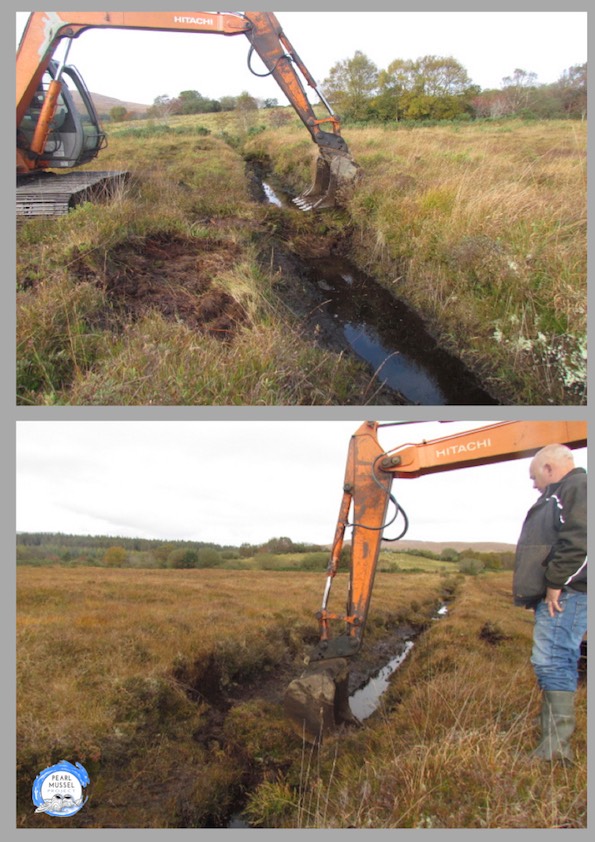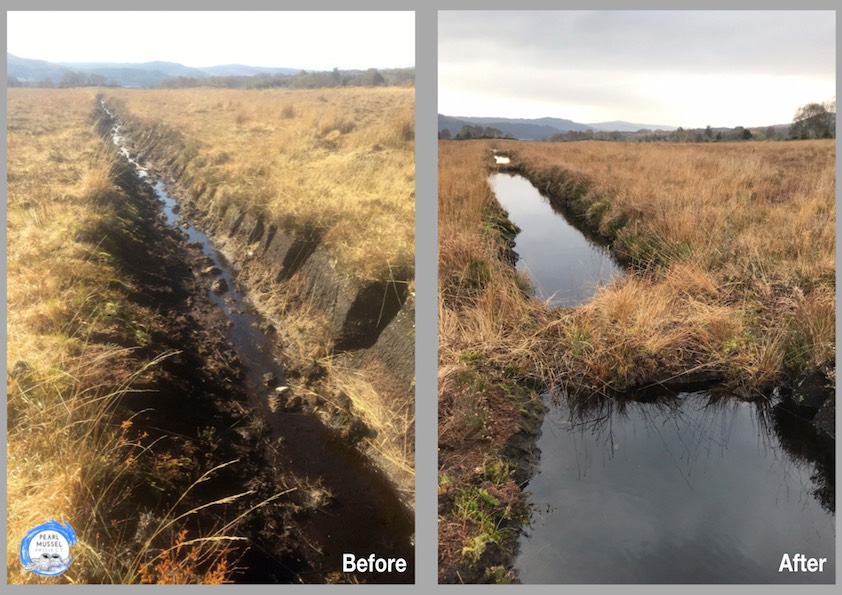Wetland habitats, in particular blanket bog and associated seepage zones, are common throughout the most important freshwater pearl mussel catchments in the west of Ireland. This is no coincidence as these wetlands play a vital role in providing the ideal habitat conditions to support freshwater pearl mussel in adjacent rivers.
Wetlands have the effect of regulating river flow thereby helping to maintain optimal flow conditions even in extreme flood and drought events. In addition, wetland areas alongside river channels provide an important food supply to juvenile mussels. These juveniles are particularly vulnerable and this food source helps to ensure their survival to adulthood.
Drained and modified wetlands cease to provide both these functions. This is likely to partly explain the decline in mussel populations throughout much of the country. Because water quality reflects land use in the catchment, pearl mussel conservation efforts need to extend beyond the river channel and focus on maintaining and restoring wetland habitats at the catchment level.
The Pearl Mussel Programme (PMP) recognises the value of these habitats and rewards farmers through a results-based approach: the higher the quality of the wetland, the higher their payment. In order to improve wetland quality, the PMP provides farmers with a budget for supporting actions, to incentivise wetland restoration and maintenance. Drain blocking is one of the measures we are funding through the supporting actions in the programme.
One of our pilot farmers, James Forrest, in the Glaskeelan catchment in Donegal has a 9 hectare peatland plot, which had been used for peat extraction and grazing. As with most turbary plots, there were extensive drains throughout. This resulted in a low habitat score for this plot, and therefore low habitat quality payment. However, we discussed various options with James for increasing his score and future payments.
Initially, James was hesitant about blocking any drains as he had the impression that it would end up completely flooding the plot. Following discussion we felt that the best thing would be to bring James to a site where drain blocking, similar to what we were proposing for his plot, had been completed so he could see what was involved and how the bog looked after the works had been completed.
We took James and a group of interested farmers to Dungonnell blanket bog restoration project in Antrim to see the outcome of drain blocking on a peatland area. This work has been carried out by Northern Irish Water in partnership with RSPB, NIEA and MFFP. As the work had been carried out 5 years ago we got to see a great example of how a peatland recovers following drain blocking.
The trip clinched the deal and James decided he was comfortable with carrying out drain blocking on approximately 1.5km of drains within the plot. In mid-October 2019 we installed 80 peat dams throughout the plot, using a wide-tracked excavator with James supervising the work (see images below). The installation of peat dams was 100% funded by the PMP.
We revisited the site a month later and were delighted with the results from the drain blocking. Although all drains on the plot have been blocked, the water is retained in the drains and very little other surface water is apparent (see images below). The site is still used to graze sheep, with a further advantage being that sheep now use the peat dams as crossing points, making the plot safer for them. James is also pleased with the works and is looking forward to seeing how the work carried out will improve his score on the plot.
PMP would like to thank James Forrest for taking the brave step, which might seem counterintuitive to many. The works will allow him to continue his farming practices, increase his PMP payments, and assist in the conservation of wetlands and of course the freshwater pearl mussel. A win win situation for all.

Supervising the installing peat dams in drained blanket bog.

Appearance of initial drain and drain with peat dams one month after completion of works.
#pearlmusselproject #musselrivers #EIPagri #RuralNetwork
